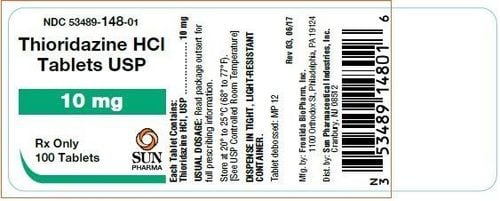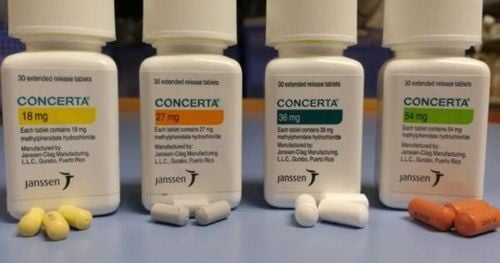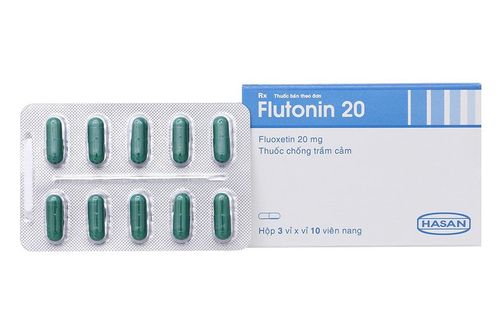This is an automatically translated article.
Poziats is an antipsychotic drug that is intended for oral administration. It is indicated in the treatment of schizophrenia, manic states, and autism spectrum disorders.
1. What are the effects of Poziats 15mg?
Poziats 15mg drug has the main ingredient Aripiprazole 15mg, prepared in tablet form.
Aripiprazole is an antipsychotic drug, with high affinity for receptors such as D2, D3, 5-HT1A, 5-HT2A; moderate affinity for D4, 5-HT2C, 5-HT7, alpha1 adrenergic and H1 receptors.
Aripiprazole acts as a partial agonist at D2, 5-HT1A receptors and as an antagonist at 5-HT2A receptors.
Like other psychotropic drugs, the mechanism of action of the drug is not clear. It is thought that the effects on these receptors are effective in patients with other mental disorders. Due to its action on alpha1 adrenergic receptors, side effects such as orthostatic hypotension may occur.
2. Indications and contraindications of Poziats 15mg
Poziats 15mg is used in the following cases:
Treatment of schizophrenia in adults and adolescents aged 15 years and over; Treatment of patients with moderate to severe acute manic episodes; Bipolar I disorder and to help prevent new manic episodes from occurring in adults who experience major manic episodes and whose manic episodes have responded to treatment with Aripiprazole; Treatment of agitation and mood swings caused by autism; Treatment of language incontinence syndrome; Aids in the treatment of depressive disorders. Contraindications to using Poziats 15mg:
Hypersensitivity to the active ingredient Aripiprazole or excipients; Because the drug contains lactose as an excipient, it should not be used in people with a history of galactose intolerance, lactase deficiency, galactose-glucose malabsorption.
3. Dosage and usage of Poziats 15mg
How to use:
Take medicine by mouth, you should take it with water at the same time of day and not affect by food. Dosage for adults:
Treatment of schizophrenia: The recommended starting dose and target dose are 10 or 15 mg once daily. Doses generally respond to 10–30 mg once daily with efficacy in trials, but in practice doses exceeding 10–15 mg daily do not result in greater efficacy, but increase the risk of adverse effects. extra. Adjust dosage at intervals of ≥2 weeks, as this is the time required for dosing to reach steady-state blood concentrations. The need for medication and the continuation of treatment should be periodically reassessed. Discontinuation of antipsychotic therapy should only be considered when the patient is in remission of symptoms for ≥ 1 year or the patient has an optimal response to antipsychotic medication. Indefinite maintenance treatment is recommended if there are multiple previous psychotic episodes or 2 episodes within 5 years. Treatment and prevention of manic episodes: 15mg orally once a day, if necessary, the dose can be increased to 30mg once a day. Supportive treatment of depressive disorder: Patients taking other antidepressants should use a low dose, starting at 2 to 5 mg and a target maintenance dose of 2 to 15 mg. Dosage in children:
Treatment of schizophrenia: For adolescents ≥13 years of age who have been used: The recommended target dose is 10mg once daily. Treatment should be initiated at a low dose of 2 mg once daily, then titrated to 5 mg once daily after 2 days and may be increased to 10 mg once daily for the next 2 days. The need for continued treatment should be periodically reassessed in the patient. Treatment of manic episodes: Children and adolescents ≥ 10 years: The target dose in the treatment of acute episodes is 10 mg once daily. The recommended initial dose for monotherapy is 2 mg once daily, then may be titrated to 5 mg once daily after 2 days and may be increased to a target dose of 10 mg once daily. day after the next 2 days. Autistic Disorders: The recommended target dose is 5-15 mg/day. It is recommended to start at a low dose of 2mg/day, then gradually increase to 5mg, then to 10-15mg. It should be increased slowly over a minimum period of one week. Treatment of difficult language control (Tourette's syndrome): The recommended dose range is 5 to 20 mg. May start with 2mg and then gradually increase according to the target. Increase slowly according to the patient's response. Dosage for the elderly:
Similar to that used in adults. Dosage in the lower end of the adult range is usually sufficient for patients with schizophrenia or late-onset psychosis.
4. Poziats 15mg . side effects
Side effects of Poziats 15mg include:
Common: Flu-like symptoms, insomnia, anxiety, restlessness, restlessness, extrapyramidal syndrome (common in young people) ), tremor, headache, neck pain, pelvic pain, sedation, drowsiness, dizziness, blurred vision, constipation, dyspepsia, vomiting, nausea, increased salivation, fatigue, tachycardia, hypotension blood pressure.
Uncommon: Hyperprolactinemia, hyperglycemia, depression, increased sexual interest, tardive dyskinesia, dystonia, restless legs syndrome, diplopia, photophobia, tachycardia, Postural hypotension, hiccups.
Unknown frequency and rare:
Leukopenia and thrombocytopenia , allergic reactions; High blood sugar causes acute complications in diabetes or sometimes causes hypoglycemia, hyponatremia; Anorexia, suicide attempts, suicidal ideation, and successful suicide; Combative; Neuroleptic malignant syndrome; Generalized convulsion, serotonin syndrome, speech disorder, ocular dystonia, sudden unexplained death, ventricular arrhythmia, cardiac arrest, bradycardia; Venous thrombosis, hypertension, aspiration pneumonia, laryngospasm, pharyngeal spasm, pancreatitis, dysphagia; Hyperthyroidism, goiter; Liver failure, hepatitis, jaundice, itching; Photoallergic reactions, alopecia, hirsutism, DRESS syndrome; Rhabdomyolysis, muscle pain, muscle stiffness; Urinary incontinence, urinary retention; Neonatal withdrawal syndrome when administered to pregnant women at the end of pregnancy; Persistent penile pain, dysregulation of body temperature, chest pain, pulmonary edema, weight gain or loss; Increased ALT, AST, GGT and alkaline phosphatase; Long QT interval; Increased glycosyl hemoglobin; Increased creatine phosphokinase; Double vision, blinking, otitis externa; Menstrual disorders; Intracranial hemorrhage; Pulmonary embolism, respiratory failure, pulmonary edema, increased sputum secretion. When using Poziats 15 may occur other side effects not mentioned above, if any side effect that you think is related to the drug, you should notify your doctor for advice and treatment if necessary. .
5. Save when taking Poziats 15mg
When taking the drug, the following should be noted:
Poziats are used under the doctor's prescription and monitored and evaluated the effects of the drug regularly. Do not increase the dose on your own or stop taking it suddenly because it can lead to symptoms of withdrawal syndrome. Discontinuation should be considered when eligible and closely monitored by a physician. Increased patient mortality risk with the use of common antipsychotics in geriatric patients with dementia-related psychosis. Antipsychotics, including Aripiprazole, are not used to treat dementia-related psychosis. There have been reports of a condition causing malignant sedation and death from this syndrome with the use of the drug. These symptoms include high fever, muscle stiffness, and autonomic dysfunction. It is necessary to stop the drug immediately and initiate treatment, monitoring symptoms is essential. The drug may worsen depression, suicidal ideation or behavior, or unusual changes in patients with major depressive disorder, whether or not they are taking antidepressants; This side effect may persist until symptoms are clinically relieved. The drug can cause orthostatic hypotension, so it should be used with caution in patients at risk of hypotension, cerebrovascular disease, cardiovascular disease, hypovolaemia, or concomitant use. Other drugs may cause hypotension or bradycardia. Change positions slowly to reduce the risk of postural hypotension. Caution should be taken when administering Poziats 15mg to patients with Parkinson's disease. The use of antipsychotics may exacerbate the movement disorders in this patient. Use caution when administering this drug to patients at risk of convulsions, including those with a history of seizures, head trauma, brain damage, alcoholics, or those receiving concomitant treatment with medications that can lower the seizure threshold. Elderly patients taking the drug may be at increased risk of convulsions due to increased predisposing factors. Pregnancy: There are no adequate studies with the use of Poziats 15mg in pregnant women. Birth defects in the fetus have been reported with the use of the drug. This product should not be used during pregnancy unless the benefit outweighs the possible risk to the fetus. Infants exposed to antipsychotic drugs (including Aripiprazole) during the third trimester of pregnancy are at risk of adverse reactions such as extrapyramidal symptoms or withdrawal symptoms. Lactation: Aripiprazole and its metabolites are excreted in human milk. Therefore, a decision must be made whether to discontinue nursing or to discontinue Aripiprazole therapy. Aripiprazole may affect the ability to drive and use machines because motor and visual disturbances, such as symptoms of excessive sedation, somnolence, syncope, blurred vision, double vision may occur.
6. Interactions with other drugs
Drugs majorly metabolised by CYP2D6, CYP3A4; Ketoconazole, Quinine inhibit the drug elimination of Aripiprazole, increase the drug concentration in the blood; Carbamazepine reduces peak plasma concentrations of Poziats 15 mg. Poziats antipsychotic 15mg is a prescription drug and should only be used when prescribed by a doctor. Poziats has the risk of causing many side effects, so during the course of taking the drug, it is necessary to periodically review and notify the doctor immediately if any abnormalities are found.
Please dial HOTLINE for more information or register for an appointment HERE. Download MyVinmec app to make appointments faster and to manage your bookings easily.













